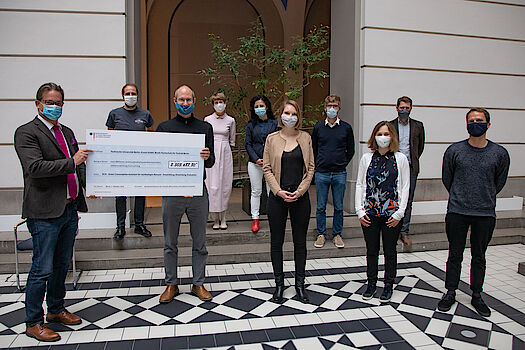Artificial intelligence (AI) has great potential to contribute to climate and environmental protection. With the initiative "AI Lighthouses for the Environment, Climate, Nature, and Resources", the German Federal Ministry for Environment (Bundesministerium für Umwelt, Naturschutz und nukleare Sicherheit – BMU) supports projects that use digital know-how and creativity to overcome ecological challenges. A total of 40 million Euro in funding is available for this purpose. On October 5, 2020, the Parliamentary State Secretary at the Federal Ministry Florian Pronold personally handed over two grants of around 2.3 million Euro and around 1.5 million Euro each to the applying scientists at TU Berlin, Einstein Center Digital Future (ECDF), and their cooperation partners.
The BMU supports the development and testing of the use of AI-based innovations to meet current ecological challenges. As AI lighthouses, these projects are intended to show to a great extent how the use of artificial intelligence can contribute to the advancement of environmental protection and the circular economy. In the funding line Application Orientation and Foundations, two of the 15 selected projects are coordinated by researchers from Technische Universität Berlin.
Prof. Dr. Tilman Santarius, Professor for Social-Ecological Transformation at TU Berlin and ECDF, is the project leader of the Green Consumption Assistant for Sustainable Consumption - Development, Application, Evaluation (GCA). Together with his ECDF colleague Prof. Dr. Felix Biessmann (Beuth University of Applied Sciences Berlin), he received the fgrant of around 2.3 million Euro earlier today. The joint project Circular Textile Intelligence (CRTX) is led by Prof. Dr. Ulrike Woggon, head of the Nonlinear Optics and PI department at ECDF, and is funded with a total of around 1.5 million Euro.
"Artificial intelligence provides many solutions for issues of the environment, climate, and natural resources. We must use this potential to our advantage even more than before. This is why we are using our initiative to promote technologies that specifically benefit the goals of climate and environmental protection. I am therefore particularly pleased to present the grants to two projects whose solutions successfully demonstrate the use of AI-based applications in the field of sustainable consumption and sustainability in the fashion industry. They show in an exemplary way that digitization and sustainable development belong together," said Parliamentary State Secretary Florian Pronold.
"The Presidential Board of TU Berlin is very pleased about the grants for these two innovative and transdisciplinary projects. The use of artificial intelligence to promote environmental protection and the circular economy is in line with the university's goal of conducting research for the benefit of society and for sustainable development," says Prof. Dr. Angela Ittel, Vice President for Strategic Development, Junior Scholars, and Teacher Education at TU Berlin.
Green Consumption Assistant
"Our consumer behavior is a major driver of climate change and environmental destruction: not only the production of consumer goods, but also their use, transport, and disposal cause high CO2 emissions, energy and raw material consumption," says Tilman Santarius, who heads the project consortium of Beuth University of Applied Sciences Berlin, Ecosia GmbH, and TU Berlin. Thus, the idea for the ECDF research project was born. "The interdisciplinary research environment gives us the opportunity to work on ideas for the digital future across our disciplines. In this project, Felix Biessmann and I combine our expertise in machine learning and sustainable digitization," reports Tilman Santarius.
To this end, the Green Consumption Assistant (GCA) will display the concrete effects of consumer decisions when searching for products in the Ecosia search engine. These include CO2 emissions, manufacturing conditions and the environmental footprint. The GCA will also provide information on more sustainable alternatives and provide direct links to these alternatives. This can include not only more ecologically and socially just products, but also information on repair, rental or sharing options that make it unnecessary to buy products in the first place. Ecosia's mapping service also highlights locations where sustainable consumption is possible, such as vegetarian restaurants, open workshops, rental stations ,and second-hand stores.
As a basis for the GCA's recommendations, a comprehensive database of open source globally accessible sustainability information on products and services is being built using machine learning techniques.
Circular Textile Intelligence
"In Germany, every fifth piece of clothing is hardly ever worn and about one billion garments are not worn for more than three months. Instead of reusing these clothes after use, whether as second-hand goods or as secondary raw material for recycled fibers, they are often disposed of. With 1.2 billion tons of CO2 eq. per year, global textile production emits more than international aviation and shipping combined," describes Ina Budde, who represents the young start-up circular.fashion, the starting point for the Circular Textile Intelligence (CRTX) project.
Within the framework of CRTX, TU Berlin, circular.fashion, and Freie Universität Berlin are searching for a solution that automates the sorting of old clothes and optimizes its sustainable effect. "Our goal is to close the gap between the collection of used textiles and specific sorting for second hand and fiber-to-fiber recycling by means of AI-supported spectroscopy and image analysis, thus enabling a continuous material cycle," says Ulrike Woggon. The insufficient identification of the material composition of textiles prevents fiber-to-fiber recycling, which would allow the recovery of yarn of the same quality. This is one of the main reasons for the low recycling rate (around one percent) of textiles. The spectroscopic methods, which are being developed under the direction of Dr. Karsten Pufahl from the Department of Nonlinear Optics, should enable an exact identification of the material composition and pollutant load. An AI-based evaluation is planned, which will overcome the previous hurdles in sorting technology and enable a closing of the material cycle. At the same time, image analysis methods are to be used to achieve more precise sorting, also for reusable garments. As an industrial partner, circular.fashion will coordinate the development and contribute essential expertise and partner networks.

